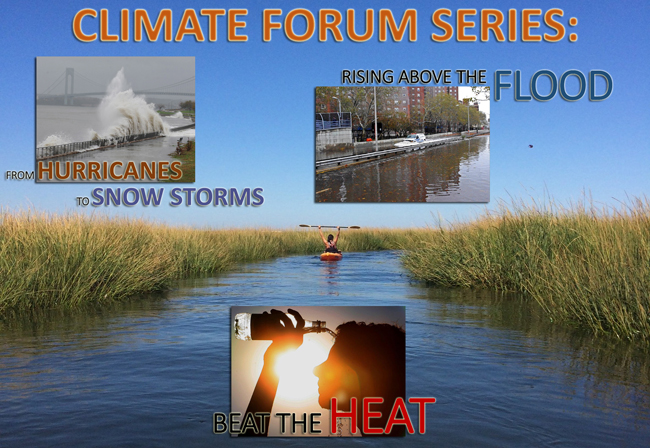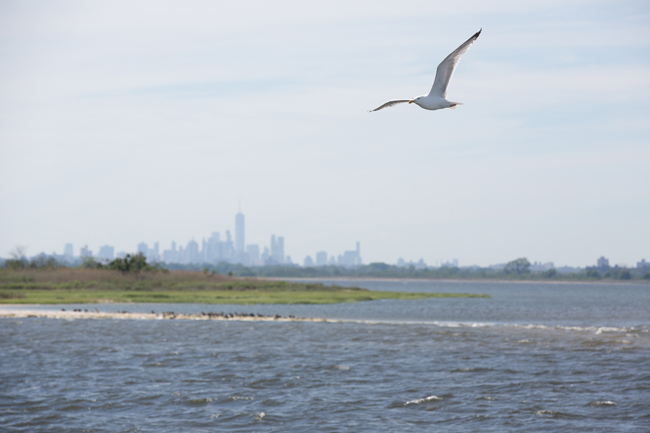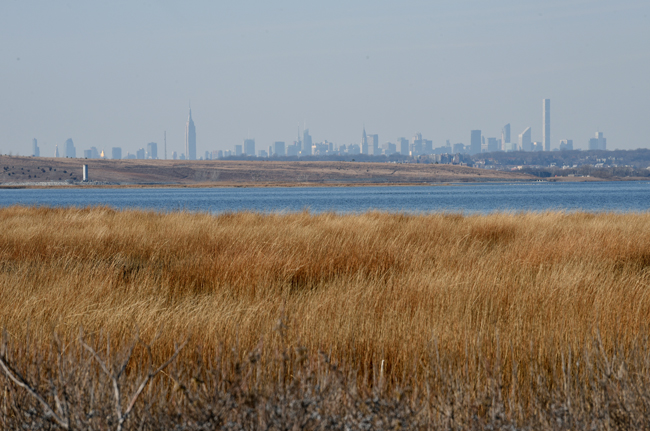— By Paul C. Focazio, New York Sea Grant

Credit: Helen Cheng/NYSG; Collage by Paul C. Focazio/NYSG
Brooklyn, NY, May 15, 2017 - In an effort to improve the coordination and delivery of climate, weather and preparedness-related information to critically-affected sectors and communities in New York City (NYC), New York Sea Grant (NYSG) partnered with the Science and Resilience Institute at Jamaica Bay (SRIJB) in November 2016 to launch a Climate Forum Series. The objective of these forums is to enhance the public’s awareness of climate-related coastal events and how they link to short-term weather threats.
The third in its series, “Beat the Heat,” will be held in the evening of Wednesday, May 24th at the Rockaway Institute for a Sustainable Environment (RISE) Center in Far Rockaway, NY, and will discuss heat waves and extreme heat-related risks. Just in time for summer, this most recent forum focuses on how warm heat waves can get in New York City, how heat affects the human body, and how residents can prepare themselves for extreme heat situations. It’s a topic of major concern, as heat is one of the leading weather-related killers in the U.S. In New York City, more than 80% of heat stroke deaths involved victims who were exposed to heat in homes without air conditioning.
Presenters include the Consortium for Climate Risk in the Urban Northeast (CCRUN), the National Center for Disaster Preparedness, the NYC Department of Health, and NYC’s Office of Emergency Management. These talks will be followed by a "tools cafe," where in speakers and community residents will have an opportunity to interact, sharing resources and asking and answering questions.

Credit: Helen Cheng/NYSG
As the topics shift with the seasons, the strength of successive forums in the series will rely on the effectiveness of ones that have come before. Pre- and post-surveys are conducted at, respectively, the start and close of each forum. When attendees arrive, they are asked which community they live in, where they receive their weather information and how prepared they think they are during a time of emergency. After each event has concluded, attendees provide their thoughts on what was most compelling about the forum and whether they have gained any new knowledge on the featured topic.
Though the first two climate forums—November 2016’s “From Hurricanes to Snow Storms (Nor’easters)” and March 2017’s “Rising Above the Flood”—occurred in, respectively, Brighton Beach/Coney Island and Canarsie, Brooklyn, many who attended came from coastal communities throughout New York City, including Staten Island and Harlem. And while sources for receiving weather and severe-weather events varied, a majority expressed an affinity for The Weather Channel, followed by Television and Radio.
During the first forum regarding the end of the Hurricane Season and entry to the Nor’easter Storm season, post-forum survey results revealed more than 75% of the attendees said they had gained a better understanding of New York City’s climate and the resources to look for in case of a severe weather event. Additionally, over 70% stated the information offered by presenters including The National Oceanic and Atmospheric Administration National Weather Service’s Weather Forecast Office in Upton, NY and The Stevens Institute of Technology, increased their preparedness for such an event. Action items included spurring residents to create or add to an existing emergency plan or kit, be more aware of where nearby evacuation routes are located and taking steps to better flood-proof their homes.
A major concern with storms such as Superstorm Sandy is flooding, which accounts for more deaths annually than any other severe weather-related hazard. As explored in the second forum by presenters like the NYC Department of City Planning and Brooklyn Neighborhood Housing Services, people underestimate the force and power of water. This is unfortunately the case, even though in recent years flooding has occurred more frequently throughout the City, affecting a broader range of communities than ever.
"In 2012 the Canarsie community was unprepared for Superstorm Sandy,” said forum attendee Harold Jones, a Canarsie resident and President of the Canarsie Community Development Inc. “Forums like these are important to educate the community so that we are better prepared for the next storm."
“Flooding can come from a variety of sources, especially in an urban coastal community,” says Kathy Bunting-Howarth, NYSG’s Associate Director. “This is why New York Sea Grant is pleased to partner with SRIJB and CCRUN to ensure communities have access to the science and the tools that can help them better prepare and protect themselves from flooding.”
Expanding on what those tools include, Jones adds, “I found out that NYC’s Office of Emergency Management developed an Emergency Planning Toolkit, which I will take the lead in developing a plan for Canarsie.” Other attendees emphasized a desire to learn how to improve their preparedness for extreme weather, with one saying, “The process by which flood victims can get help needs to be made easier.”

Credit: Cornell CALS
“We’re finding that bringing the diverse perspective and expertise of scientists, weather forecasters, emergency managers, local decision-makers and community leaders into one room with city residents makes these forums unique and powerful," says Adam Parris, SRIJB’s Executive Director.
“These communities value access to resources and the strength of social ties that arise when different groups come together,” says Climate forum host and facilitator Helen Cheng, SRIJB’s New York Sea Grant Coastal Resilience Specialist. “Their members know that there is a lot of information available, but it may not be easily accessible or even understandable. So, sharing information and perspectives with each other through the series’ peer-to-peer interaction is helping to create awareness, appreciation and care for shared goals of preparedness and resilience. "
For more on the Climate Forum Series, visit NYSG at www.nyseagrant.org/jamaicabay. Also featured is a newly-launched podcast series. Each story is from one of the nearly three million people who live and work in the estuary’s watershed, most of which is situated in the City’s boroughs of Brooklyn and Queens, with portions in the east falling within Long Island’s Nassau County.
More Info: New York Sea Grant and SRIatJB
In February 2016, a formal announcement of the partnership between New York Sea Grant and The Science and Resilience Institute @ Jamaica Bay
(SRIJB) was made with the hiring of a Jamaica Bay Coastal Resilience
Specialist, who, along with SRIJB, is located at Brooklyn College.
SRIJB is a new research center focused on enhancing environmental,
social, and economic resilience in communities of Jamaica Bay funded by
the Rockefeller Foundation and the City of New York.
New York Sea Grant (NYSG), a cooperative program of Cornell University
and the State University of New York, is one of 33 university-based
programs under the National Sea Grant College Program (NSGCP) of the
National Oceanic and Atmospheric Administration (NOAA). The NSGCP
engages this network of the nation’s top universities in conducting
scientific research, education, training and extension projects designed
to foster science-based decisions about the use and conservation of our
aquatic resources. Through its statewide network of integrated
services, NYSG has been promoting coastal vitality, environmental
sustainability, and citizen awareness about the State’s marine and Great
Lakes resources since 1971.
New York Sea Grant maintains Great Lakes offices at SUNY Buffalo, the
Wayne County Cooperative Extension office in Newark and at SUNY Oswego.
In the State's marine waters, NYSG has offices at Stony Brook University
and Stony Brook Manhattan, in the Hudson Valley through Cooperative
Extension in Kingston and at Brooklyn College.
For updates on Sea Grant activities: www.nyseagrant.org has RSS, Facebook, Twitter, and YouTube links. NYSG produces a monthly e-newsletter, "NOAA Sea Grant's Social Media Review," via its blog, www.nyseagrant.org/blog. Our program also offers a free e-list sign up via www.nyseagrant.org/coastlines for its flagship publication, NY Coastlines/Currents, which is published 1-2 times a year.